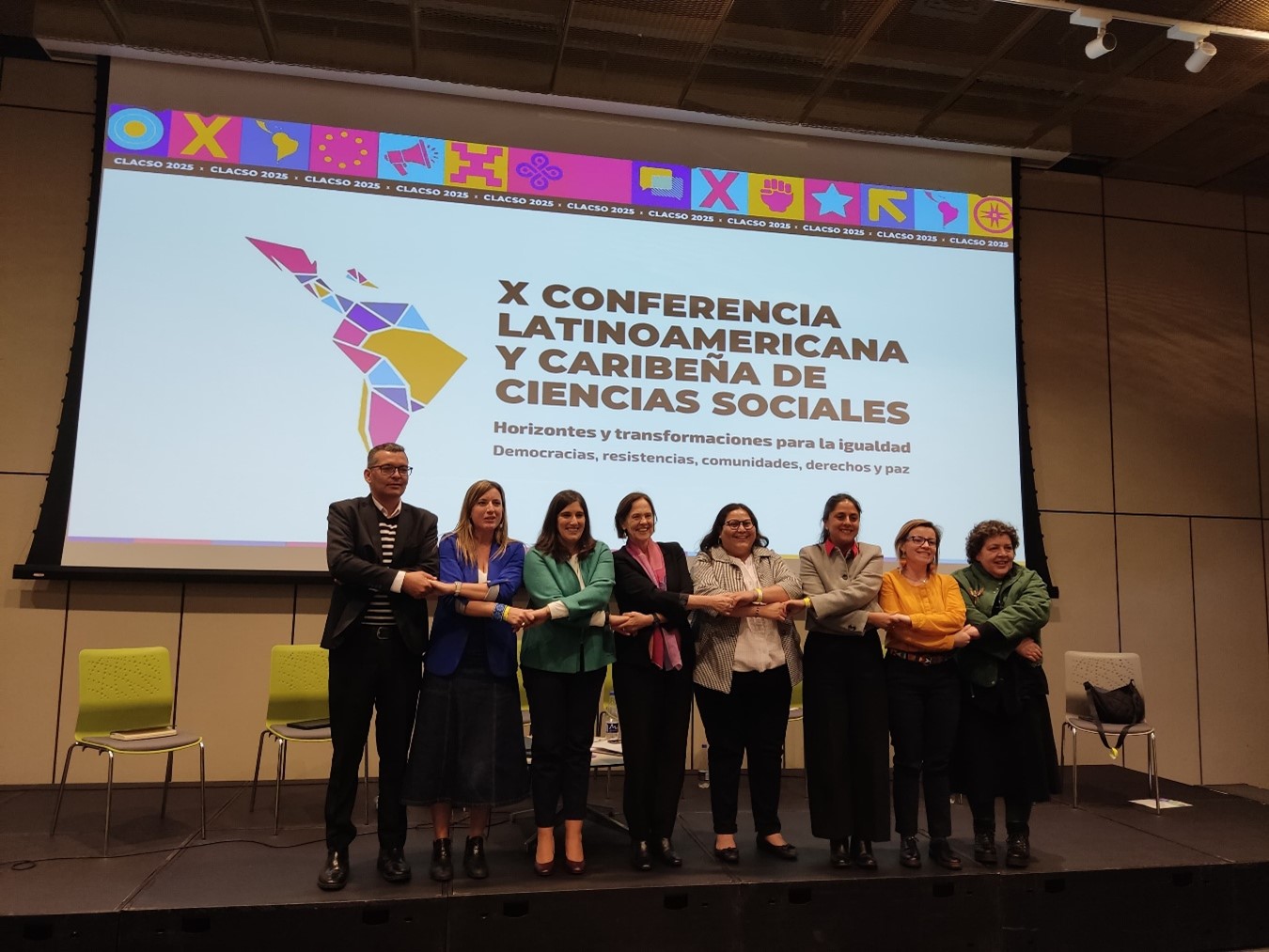ECLAC participates in the Tenth Latin American and Caribbean Conference on Social Sciences organized by CLACSO and co-organizes the Thematic Forum: “Critical Perspectives on Care, Gender Equality and Social Justice”
Work area(s)
This edition of the Conference focused on “Horizons and Transformations for Equality” and served as a space for dialogue on care and progress towards gender equality and sustainable development. The Division for Gender Affairs of ECLAC took part in central panels and co-organized the Thematic Forum “Critical Perspectives on Care, Gender Equality and Social Justice,” where the importance of advancing towards a Care Society and promoting exchanges among public policymaking institutions was highlighted.

Between 9 and 12 June 2025, Bogotá hosted the 10th Latin American and Caribbean Conference on Social Sciences. This edition of the Conference focused on “Horizons and Transformations for Equality” and served as a space for dialogue on care and progress towards gender equality and sustainable development. The Division for Gender Affairs of ECLAC took part in central panels and co-organized the Thematic Forum “Critical Perspectives on Care, Gender Equality and Social Justice,” where the importance of advancing towards a Care Society and promoting exchanges among public policymaking institutions was highlighted.
This Forum was organized jointly with the CLACSO Working Group on Care and Gender, the United Nations Entity for Gender Equality and the Empowerment of Women (UN Women), the United Nations Research Institute for Social Development (UNRISD), the International Development Research Centre (IDRC), the Friedrich-Ebert-Stiftung Foundation in Colombia (FESCOL), and OXFAM.
During the opening session, Ana Güezmes García, Director of ECLAC’s Division for Gender Affairs (DAG), stressed that Latin America and the Caribbean is the only region in the world with an intergovernmental body on women’s rights—the Regional Conference on Women in Latin America and the Caribbean—from which agreements have been built to chart a roadmap towards equality. Since 1977, this Conference has fostered constructive dialogue for shaping a Regional Gender Agenda with key agreements aimed at overcoming the sexual division of labour, addressing the care crisis, promoting a fair social organization of care, and recognizing the essential role of care in the functioning of the economy. The sixteenth session of the Regional Conference on Women will be held in Mexico City from 12 to 15 August 2025 under the theme “Transformations in the political, economic, social, cultural and environmental spheres to advance the Care Society and gender equality.”
On the first day of the Thematic Forum, Lucía Scuro, Senior Social Affairs Officer of the DAG, moderated the panel “Care Policies in Latin America and the Caribbean: Current Situation,” with the participation of Amparo Hernández on behalf of the CLACSO Working Group on Care and Gender, along with officials responsible for care policies from six countries: Ariel Fonseca, Vice Minister of the Ministry of Labour and Social Security of Cuba; Citlalli Hernández, Secretary for Women of Mexico; Francisca Gallegos, Undersecretary of Social Services of the Ministry of Social Development and Family of Chile; Laís Abramo, National Secretary for Care and Family of the Ministry of Social Development and Assistance, Family and the Fight against Hunger of Brazil; Natalia Moreno, Director of Care of the Ministry of Equality and Equity of Colombia; and Valentina Perrota, Director of Care of the Ministry of Social Development of Uruguay. The session fostered a rich dialogue on regional progress and national experiences in the design and implementation of public care policies, constituting a key space for exchange and an opportunity to strengthen the collective construction of these policies.
As part of the representation of the Division for Gender Affairs, Lucía Scuro also participated in the panel “Contributions from International Cooperation to Debates and Policies on Care,” where she presented ECLAC’s work and contribution to the design and implementation of policies to overcome multiple crises and the structural challenges of inequality in the region, including the sexual division of labour and the unfair social organization of care. In line with its mandate, ECLAC’s work focuses on: (i) generating knowledge directly linked to the design and implementation of public policies; (ii) providing direct support and capacity-building to countries, recognizing their specific needs; and (iii) promoting spaces for political and technical dialogue through instruments such as the Regional Conference on Women and the Gender Equality Observatory of Latin America and the Caribbean. This session also featured contributions from FESCOL, IDRC, UNRISD, UN Women, and OXFAM.
Thus, during the CLACSO Conference, the essential role of care was reaffirmed as a means of advancing the implementation of the Regional Gender Agenda and the 2030 Agenda for Sustainable Development. Through dialogue and exchange among governments, international organizations, civil society, and academia, it is possible to establish common goals to overcome the structural challenges of inequality and achieve women’s autonomy and gender equality.